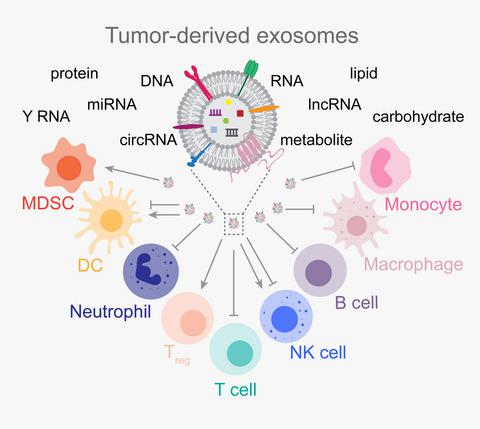Our official English website, www.x-mol.net, welcomes your
feedback! (Note: you will need to create a separate account there.)
Exosomes as Mediators of Immune Regulation and Immunotherapy in Cancer.
The FEBS Journal ( IF 5.5 ) Pub Date : 2020-09-10 , DOI: 10.1111/febs.15558 Fernanda G Kugeratski 1 , Raghu Kalluri 1, 2, 3
The FEBS Journal ( IF 5.5 ) Pub Date : 2020-09-10 , DOI: 10.1111/febs.15558 Fernanda G Kugeratski 1 , Raghu Kalluri 1, 2, 3
Affiliation

|
Exosomes are nanosized extracellular vesicles of endosomal origin that enclose a multitude of functional biomolecules. Exosomes have emerged as key players of intercellular communication in physiological and pathological conditions. In cancer, depending on the context, exosomes can oppose or potentiate the development of an aggressive tumor microenvironment, thereby impacting tumor progression and clinical outcome. Increasing evidence has established exosomes as important mediators of immune regulation in cancer, as they deliver a plethora of signals that can either support or restrain immunosuppression of lymphoid and myeloid cell populations in tumors. Here, we review the current knowledge related to exosome‐mediated regulation of lymphoid (T lymphocytes, B lymphocytes, and NK cells) and myeloid (macrophages, dendritic cells, monocytes, myeloid‐derived suppressor cells, and neutrophils) cell populations in cancer. We also discuss the translational potential of engineered exosomes as immunomodulatory agents for cancer therapy.
中文翻译:

外泌体作为癌症免疫调节和免疫治疗的介质。
外泌体是包含大量功能性生物分子的内体来源的纳米级细胞外囊泡。外泌体已成为生理和病理条件下细胞间通讯的关键参与者。在癌症中,根据具体情况,外泌体可以对抗或增强侵袭性肿瘤微环境的发展,从而影响肿瘤进展和临床结果。越来越多的证据表明,外泌体是癌症免疫调节的重要介质,因为它们传递的信号过多,可以支持或抑制肿瘤中淋巴和骨髓细胞群的免疫抑制。在这里,我们回顾了与外泌体介导的淋巴细胞(T 淋巴细胞、B 淋巴细胞和 NK 细胞)和骨髓(巨噬细胞、树突细胞、单核细胞、骨髓来源的抑制细胞和中性粒细胞)在癌症中的细胞群。我们还讨论了工程外泌体作为癌症治疗免疫调节剂的转化潜力。
更新日期:2020-09-10
中文翻译:

外泌体作为癌症免疫调节和免疫治疗的介质。
外泌体是包含大量功能性生物分子的内体来源的纳米级细胞外囊泡。外泌体已成为生理和病理条件下细胞间通讯的关键参与者。在癌症中,根据具体情况,外泌体可以对抗或增强侵袭性肿瘤微环境的发展,从而影响肿瘤进展和临床结果。越来越多的证据表明,外泌体是癌症免疫调节的重要介质,因为它们传递的信号过多,可以支持或抑制肿瘤中淋巴和骨髓细胞群的免疫抑制。在这里,我们回顾了与外泌体介导的淋巴细胞(T 淋巴细胞、B 淋巴细胞和 NK 细胞)和骨髓(巨噬细胞、树突细胞、单核细胞、骨髓来源的抑制细胞和中性粒细胞)在癌症中的细胞群。我们还讨论了工程外泌体作为癌症治疗免疫调节剂的转化潜力。











































 京公网安备 11010802027423号
京公网安备 11010802027423号